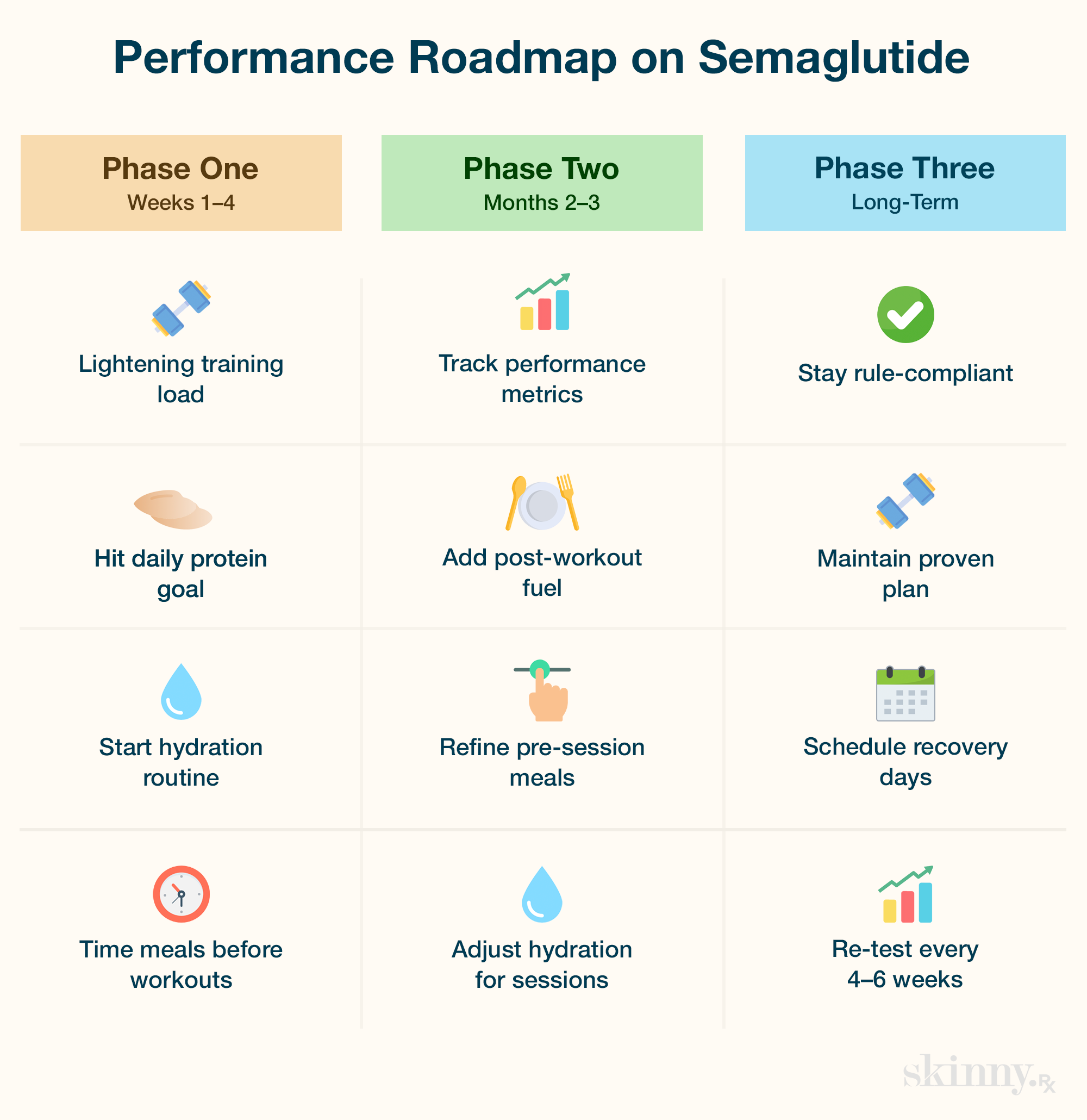
Key Takeaways
- Semaglutide can affect athletic performance through reduced appetite, slower digestion, and short-term fatigue, making nutrition and energy management critical.
- Reduced appetite combined with high training demands increases the risk of muscle loss, making consistent protein intake and calorie adequacy critical for maintaining strength and body composition.
- While appealing for rapid weight cuts in weight-class sports, semaglutide can compromise long-term performance and health if used as a shortcut rather than part of a structured plan.
- Athletes can protect their performance by proactively adjusting training loads, ensuring proper hydration, and timing meals to match the medication’s effects on digestion and energy levels.
If you’re an athlete—professional, recreational, or somewhere in between—and you’re taking or considering semaglutide, there are a few things you need to know.
First, Ozempic, Wegovy, and other semaglutide medications were not designed as sports supplements. Semaglutide, originally developed to treat diabetes, acts in three major ways; it slows digestion and gastric emptying, curbs appetite, and regulates blood sugar.
Yet athletes and sportsfolk are turning to these popular medications in greater numbers. According to a 2025 study, “A sizeable proportion of exercisers and recreational athletes contemplated GLP-1 agonist use for body image enhancement purposes.”
The real question is, how does semaglutide affect athletic performance? That’s what we’re here to unpack. Let’s get started.
Why Athletes Are Considering Semaglutide
That 2025 study, which included a survey of 681 “exercisers and recreational athletes,” noted that 25% of participants were considering semaglutide for “physical appearance purposes.” 2.9% had already taken it in one form or another.
There’s a powerful social element at play here, to be sure. But semaglutide may also have potent, if indirect, effects on performance on the track, field, mats, or court.
Body Composition
On the cultural side of things, hobbyist and professional athletes alike often feel pressured to maintain a toned, muscular physique, even to the detriment of performance, due to perceptions about what an athletic body “should” look like.
A 2023 systematic review, which looked at the existing literature collectively, observed that a significant number of athletes suffer from body image dissatisfaction (BID) to varying degrees while active in their sports of choice.
Weight-Class Sports
Sports with rigid weight categories—think most combat or strength sports, martial arts, or even bodybuilding—require athletes to be equally rigid about managing their weights.
For competitors, semaglutide brands like Ozempic or Wegovy can be viewed as a practical shortcut. Cutting weight for a competition is an often restrictive and mentally taxing process which may be aided by the appetite blunting capabilities of semaglutide.
The Realities of “Off-Label” Use in Sports
The inherently competitive nature of sports, whether you’re playing in a pick-up league or the big leagues, can be stressful. “Off-label” drug usage, which means taking a supplement or medication for any purpose other than what it was approved for, is concerningly common.
A 2024 narrative review highlighted what the authors called “a growing problem” of off-label drug use among athletes, who often feel pressured to experiment with anything that may confer an advantage.
That’s where semaglutide fits in; it was not made for athletes, but it is finding its way into sporting ecosystems all the same. Let’s look at how semaglutide might help, and harm, athletes who take it.
How Semaglutide Affects Athletic Performance
Semaglutide has a number of noteworthy effects on your body, beyond the rapid weight loss it is known for. GLP-1 agonists may affect your energy levels, body composition, and recovery habits as well.
Energy Systems
Fatigue is one of the most commonly reported side effects of semaglutide.
But some data show it to affect fewer than 10% of people who take it—the study in question observes fatigue as a “significant” side effect which, in academic contexts, tends to mean “real and noticeable” more than “severe”. Still, athletes are wise to be wary.
Luckily, the fatigue associated with semaglutide is often temporary and diminishes or dissipates entirely after your first few weeks on the medication. Most people only experience fatigue in the day or two following their injection.
If fatigue persists, you may have to modify your physical activity habits to accommodate—more on that later.
Recovery
Semaglutide does not directly harm recovery from sports or intense workouts. That said, common side effects such as loss of appetite, disordered sleep, or an upset stomach may indirectly make it more difficult to bounce back.
If you’re on a GLP-1 medication like Ozempic or Wegovy, it becomes all the more essential to be diligent about your sleep and nutrition. Dialing your activity levels back a bit when you’re starting semaglutide is probably wise as well.
Body Composition
As a potent appetite suppressant, semaglutide users commonly experience muscular atrophy, or the reduction in muscle mass as your body turns to it for fuel. Muscle is “metabolically active” tissue, which among its many beneficial health effects also burns calories.
Therefore, an athlete with a rigorous training schedule who takes semaglutide might experience a double-whammy of requiring lots of calories to sustain their performance, which they struggle to consume due to having a diminished appetite from taking GLP-1s.
This coupling—intense but typical athletic training alongside appetite suppression from semaglutide—encourages muscle loss along with reductions in body fat, altering body composition for the worse.
Sport-Specific Considerations
Semaglutide isn’t a high-risk medication for athletes, but anyone who plays sports or hits the gym hard should understand how it may affect them.
For Strength & Power Athletes
Bodybuilders, powerlifters, sprinters, throwers, and the like should be aware of circumstantial drawbacks to taking semaglutide. The number-one thing to be aware of is the medication’s ability to cause or accelerate muscle loss.
Muscular atrophy doesn’t occur overnight, but months of excessive undereating may cause your body to strip away more than fat, which can significantly decrease strength performance.
For Endurance Athletes
When it comes to endurance-based athletics and semaglutide, managing fatigue and, possibly, adjusting your fueling habits is crucial. If you’ve found a groove that works for you, you want to avoid letting the effects of semaglutide alter things too much.
For example, Ozempic (and others) delay gastric emptying. On long-distance runs or bikes, this can affect when or how often you stop to use the bathroom. The appetite suppression may make you forget to refuel during or after a workout, hampering your energy further.
Additionally, athletes should consider giving more time between their meal and their workout, since the delayed gastric emptying can cause heartburn or acid reflux.
For Recreational Athletes
If you keep it casual with your favorite sport, the considerations above still apply to you, just not necessarily with the same gravity as if you had a qualification or trophy on the line. No matter your “why”—such as if you’re diabetic—it pays to work with the effects of semaglutide, not against them.
If you experience short-term fatigue in the hours or days after your injection, try adjusting your workout schedule. Finding it difficult to fuel yourself adequately? Set reminders on your phone for your pre-workout snack or post-workout meal.
Strategies to Protect Performance on Semaglutide
Taking semaglutide and want to stay in top form as an athlete? Here are a few actionable strategies to try.
Protein Timing
You’ve probably, rightfully, heard that protein is the “building block of muscle tissue.” A high-protein diet is non-negotiable for the professional athlete. It’s a wise investment for just about everyone else as well, due to protein’s effects on muscle sparing and satiety.
Make it mandatory to include protein at every meal, particularly if you’re struggling to eat on semaglutide. This goes double if you train in the morning before having breakfast—a small amount of protein such as from Greek yogurt or a protein bar can go a long way here.
Remember: The most contemporary protein intake recommendations for active people, especially those who do strength training, ranges from 1.6 to 2.2g/kg (0.73 to 1.0g/lb) per day.
How you space that intake out across your day and the meals you eat is mostly up to you, but play it safe and put some protein on your plate at every meal to start with.
Adjusted Periodization
Just like you can’t out-train a bad diet, you may not be able to overcome the side effects of semaglutide on sheer willpower. In such cases, it’s best to modify your periodization—a fancy term for how you organize your sports training over weeks and months—to accommodate.
For example, if you know you’ll be starting semaglutide in the near future, you might consider scheduling a deload, or a period of intentionally easy training, to coincide with your first dosages.
Hydration Protocols
The Ozempic prescribing information highlights dehydration as a principal side effect. While this may be a mild concern for non-athletes, it should be top of mind for anyone who plays a sport or hits the gym hard. Especially so if you exercise outdoors in a hot climate.
Be extra-diligent about your fluid intake while on semaglutide. For reference, Johns Hopkins Medicine recommends 6 to 12 ounces per 20 minutes of “sports play” for adults, and suggests drinking 24 ounces of a beverage with electrolytes roughly 2 hours beforehand.
The Athlete’s Semaglutide Timeline
Here’s a broad breakdown of what you can expect over the course of using a semaglutide medication as an athlete.
Weeks 1-4
People react to semaglutide at different rates, but you can generally expect to notice the most pronounced side effects in the first few weeks.
It’s wise during this acclimation period to dial back on your sports or athletic training if possible and use it to assess how you may need to change your behaviors while on the medication.
Months 2-3
At this point, you should have adjusted to injecting semaglutide weekly. However, the two-to-three-month point is where you’re more likely to notice the negative effects of eating too little or unwanted changes to body composition.
In such cases, this is the time to consult with your coach on adjusting your training, doubling down on your health habits outside the gym, or reaching out to your physician.
Long-Term Maintenance Strategies
Semaglutide does not directly inhibit athletic performance, but over the long term, may slowly alter your habits in a way that affects your capabilities. Luckily, if your performance is starting to slip, the solution is the same whether you’re on the medication or not.
Ensure that you’re hitting your nutritional benchmarks, and don’t be afraid to set reminders around your workouts or practices accordingly. Beyond that, make sure you’re getting enough sleep, and if fatigue is a problem, don’t be afraid to use a pre-workout supplement for important workouts.
If you find tiredness to be a persistent roadblock, don’t turn to the supplement cabinet. Talk to your physician.

Final Thoughts
Athletes are taking semaglutide at increasing rates, and not just to shed unwanted pounds. If you’re into sports and considering the same, it pays to be aware of the side effects and how Ozempic or Wegovy might harm your performance.


 Medically Reviewed
Medically Reviewed



